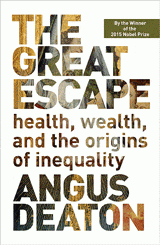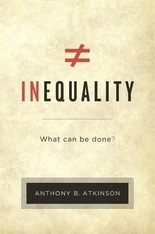
The Great Escape: Health, Wealth, and the Origins of Inequality, Angus Deaton (Princeton: Princeton University Press, 2013), 376 pp., $18.95 paper, $29.95 cloth.
Inequality: What Can Be Done?, Anthony B. Atkinson (Cambridge, Mass.: Harvard University Press, 2015), 400 pp., $29.95 cloth.
Deng Xiaoping once said, “Let some get rich first, the others will follow.” This is Angus Deaton’s basic view in  The Great Escape. Deaton, cowinner of the Leontief Prize in 2014 and winner of the Nobel Prize in 2015, chronicles the rise of almost all of humanity out of conditions of widespread hunger, disease, destitution, and premature death, and into a world where infant and child mortality has fallen sharply, and where heart diseases and even cancers are declining. Consequently, with exceptions related to AIDS and in the poorest countries, life overall is longer and health better than ever before.
The Great Escape. Deaton, cowinner of the Leontief Prize in 2014 and winner of the Nobel Prize in 2015, chronicles the rise of almost all of humanity out of conditions of widespread hunger, disease, destitution, and premature death, and into a world where infant and child mortality has fallen sharply, and where heart diseases and even cancers are declining. Consequently, with exceptions related to AIDS and in the poorest countries, life overall is longer and health better than ever before.
There is a strong correlation between such measures of wellbeing and economic income. Deaton shows that the link is logarithmic: a proportional change in national income is tied to a step-change in longevity or scales of happiness or life satisfaction. The reasons for this are less clear. The causes of movement in health indicators, for instance, must themselves be teased out from the history of overcoming particular diseases. Vaccinations and antibiotics have contributed to rising health standards, but Deaton shows that they are a secondary part of the story. For example, the use of variolation to control smallpox long predated the vaccine; the practice came from Africa to America on slave ships, and Boston was smallpox free by 1760. Similarly, in the nineteenth century infectious diseases like cholera yielded to improvements in the quality of drinking water, while in the mid twentieth century vast—amazingly vast—gains were made by public health campaigns against smoking. (Alas, these were less effective with women, whose smoking rates continued to rise, and who will be paying the price for many decades still to come.)
Importantly, however, the starting point for these gains was exceptionally low. Deaton notes that the forensic record on heights and weights tells us that the eighteenth and nineteenth centuries may have been the worst in human history for malnutrition and stunted development; the hunter-gatherers and agriculturists who peopled the earlier millennia were in important ways better off. The Great Escape followed a Great Fall; Karl Marx and Victor Hugo appeared when they were needed.
Deaton’s point here, however, is that all of the great gains since the disasters of the Conquest and the Industrial Revolution have generated inequality. Whatever the field (medicine, hygiene, transport, housing) someone—or some country, city, or township—has to go first, and thus a gap opens up. If some are successful, the good practices spread and inequality narrows again later on, when the laggards catch up. But without rising inequality in the first place, there would be no gap to close and no Great Escape. Whether the rate of infant mortality is two per thousand or forty per thousand makes a vast difference. But, following Deaton, the existence of that differential (or even the fact that it may be rising as mortality falls in the rich countries), harsh though it is, is not necessarily a bad thing at any given moment of time. It may be a sign of progress, and not of injustice. The important goal is to ensure that the gap, once opened, closes again in the right way.
This article is available to subscribers only. Access the article here.
More in this issue
Fall 2016 (30.3) • Response
Robots and Respect: A Response to Robert Sparrow
Robert Sparrow recently argued in this journal that several initially plausible arguments in favor of the deployment of autonomous weapon systems (AWS) in warfare are ...
Fall 2016 (30.3) • Essay
Climate Contributions and the Paris Agreement: Fairness and Equity in a Bottom-Up Architecture
Ethical questions of fairness, responsibility, and burden-sharing have always been central to the international politics of climate change and efforts to construct an effective intergovernmental ...

Fall 2016 (30.3) • Essay
Swedish Feminist Foreign Policy in the Making: Ethics, Politics, and Gender
In 2014 the world’s first self-defined feminist government was formed in Sweden. As part of that ambitious declaration, Sweden also became the first state ever ...